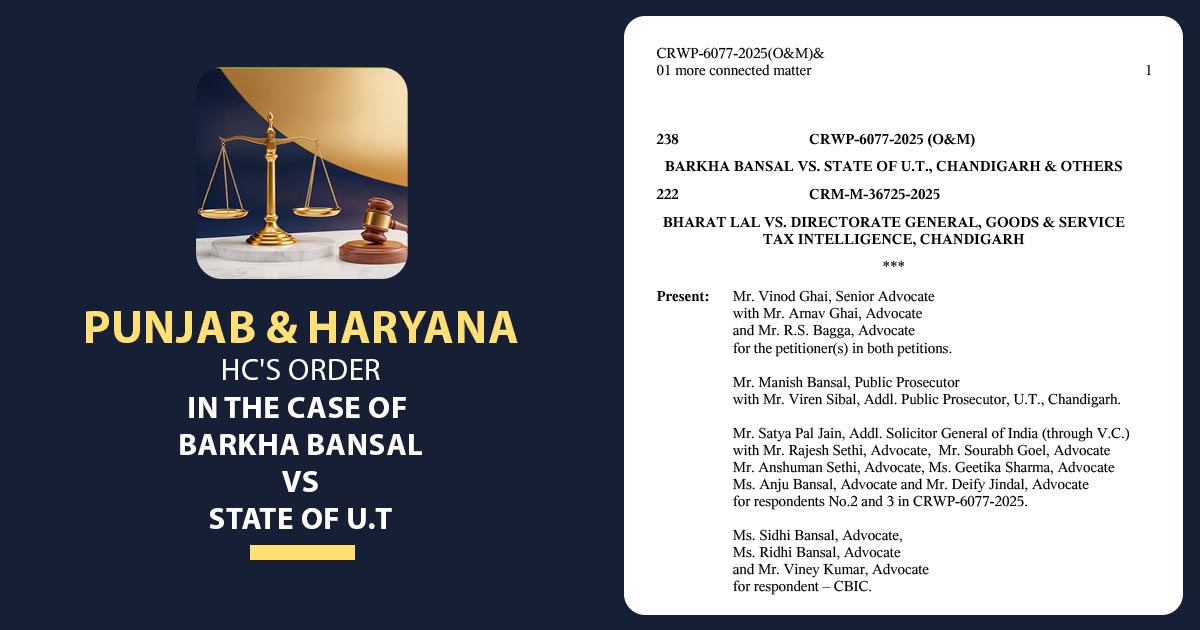
The Punjab and Haryana High Court has ruled that when someone is called in by the officials from the Directorate General of Goods and Services Tax Intelligence (DGGI), their statement must be taken during regular working hours and with their lawyer present. The Court also highlighted that the individual has the right to ask for video recordings of the meeting.
The development has arrived in the case of illegal detention of 30 hours, in which a businessman was kept in the zonal office overnight and subjected to prolonged interrogation.
Read Also: MoF Empowers DGGI (GST Intelligence) to Block Prohibited Online Content
Justice Harpreet Singh Brar cited that, “The statement of any person summoned by the DGGI must be recorded during office hours, given the judgment rendered by a Division Bench of the Bombay High Court in Mahesh Devchand Gala vs. Union Of India of India and others. Further, the person so summoned is well within his rights to record his statement in the presence of his counsel. The counsel may be present in the field of vision of the summoned person but not his hearing range, in terms of the judgment of a Division Bench of the Telangana High Court in Agarwal Foundries…”
As per the Judge, any person summoned to the DGGI may request their statement to be recorded under CCTV surveillance, given the judgment of the Apex Court in the Paramvir Singh Saini case.
The Court was hearing a habeas corpus plea of Bharat Lal Garg was summoned to record his statement about an ongoing investigation, during which data was extracted from his laptop for forensic analysis.
It cited that a cognisable offence had not been confirmed during the time, rendering even consideration of his arrest premature.
The proposal to arrest him was moved only at 5.46 pm on June 5 and approved by the Additional Director General an hour later “mechanically, without reviewing the material available” and without the mandatory Document Identification Number (DIN), making the authorisation “deemed invalid”.
Situations Orchestrated Where Choice Was Rendered Illusionary
Justice Brar, while refusing the claim that Garg stayed at the office for interrogation “voluntarily”, said that the erosion of fundamental rights is cloaked by procedural formalities, and subtly, these circumstances are orchestrated where choice is rendered illusory. When one is summoned to the office of a state-run agency and kept under watch, an environment suggesting stepping out is not an option.
The fact that DGGI officials have the authority to arrest is enough to cause a feeling of fear and inhibition in the mind of the detenue, which makes the case an instance of psychological pressure, it expressed.
“The unspoken threat that leaving without permission would be met with immediate restraint and give rise to adverse consequences ensures that the detenue does not believe that exercising his fundamental rights is a real option,” the bench cited.
Read Also: DGGI and State GST Authorities Cannot Conduct Parallel Probes on the Same Issue
The illusion of voluntariness renders any consent invalid even though the DGGI officials claim that the detenue stayed present of his own accord. With the constitutional promise of liberty, this Court must ensure that a citizen’s rights are rendered only theoretical.
DGGI Officials do not reason to interrogate at Night
The court, DGGI officials do not specify any reasons required for the continuation of interrogation into the night.
The court, as the detenue was conducted in informal custody for an undetermined period, he is qualified to the protections available under Articles 21 and 22 of the Constitution.
Courts must Balance Between the Reasonable Needs of Law Enforcement Agencies and the Protection of Citizens
The Judge said that the “Courts are required to strike a balance between the reasonable needs of law enforcement agencies and protection of citizens from abuse of power. Further, in this regard, judicial review is available to the extent of examining whether the satisfaction regarding ‘reasons to believe’ is based upon material which establishes the guilt of the arrestee and, if adequate and due care is taken to ensure that the arrest is not made arbitrarily, on the whims and fancies of the authorities.”
The Court, after analysing the landmark Supreme Court‘s decisions, concluded that the Commissioner should:
- Record his opinion in the file
- Consider the nature of the offence
- The role of the person involved
- The evidence available on record
- Satisfaction that the person engaged is guilty of the offence
The court, while marking that DGGI officials placed the detenue under restraint at 05:46 PM on June 05, and does not specify any urgency in supplying the grounds of arrest to him, mentioned that “the subsequent process of arrest and remand stands vitiated.”
| Case Title | Barkha Bansal vs. State of U.T |
| Case No. | CRM-M-36725-2025 |
| For the Appellant | Mr. Vinod Ghai, Mr. Arnav Ghai, Mr. R.S. Bagga |
| For Respondents | Mr. Satya Pal Jain, Mr. Rajesh Sethi, Advocate, Mr. Sourabh Goel, Mr. Anshuman Sethi, Ms. Geetika Sharma, Ms. Anju Bansal, Mr. Deify Jindal |
| Punjab and Haryana High Court | Read Order |









